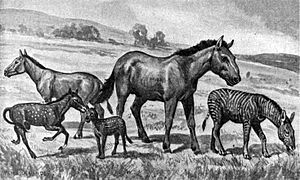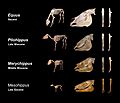Equidae facts for kids
Quick facts for kids Equids |
|
|---|---|
 |
|
| Plains Zebras | |
| Scientific classification | |
| Kingdom: | |
| Phylum: | |
| Class: | |
| Order: | |
| Family: |
Equidae
Gray, 1821
|
| Genus: |
Equus
Linnaeus, 1758
|
Equidae is a family of odd-toed ungulate mammals. The family has only one surviving genus: Equus. Horses, donkeys and zebras belong in this genus.
Animals of the Equus genus can have hybrid offspring, but they are usually sterile.
They can have many different colours.
Evolution

The oldest known fossils assigned to Equidae date from the early Eocene, 54 million years ago. They used to be assigned to the genus Hyracotherium, but the type species of that genus now is regarded to be not a member of this family. The other species have been split off into different genera. These early Equidae were fox-sized animals with three toes on the hind feet, and four on the front feet. They were herbivorous browsers on relatively soft plants, and already adapted for running. The complexity of their brains suggest that they already were alert and intelligent animals. Later species reduced the number of toes, and developed teeth more suited for grinding up grasses and other tough plant food.
The family became relatively diverse during the Miocene, with many new species appearing. By this time, equids were more truly horse-like, having developed the typical body shape of the modern animals. Many of these species bore the main weight of their bodies on their central, third, toe, with the others becoming reduced, and barely touching the ground, if at all. The sole surviving genus, Equus, had evolved by the early Pleistocene, and spread rapidly through the world.
Images for kids
-
Equus (Przewalski's horse)
See also
 In Spanish: Équidos para niños
In Spanish: Équidos para niños





